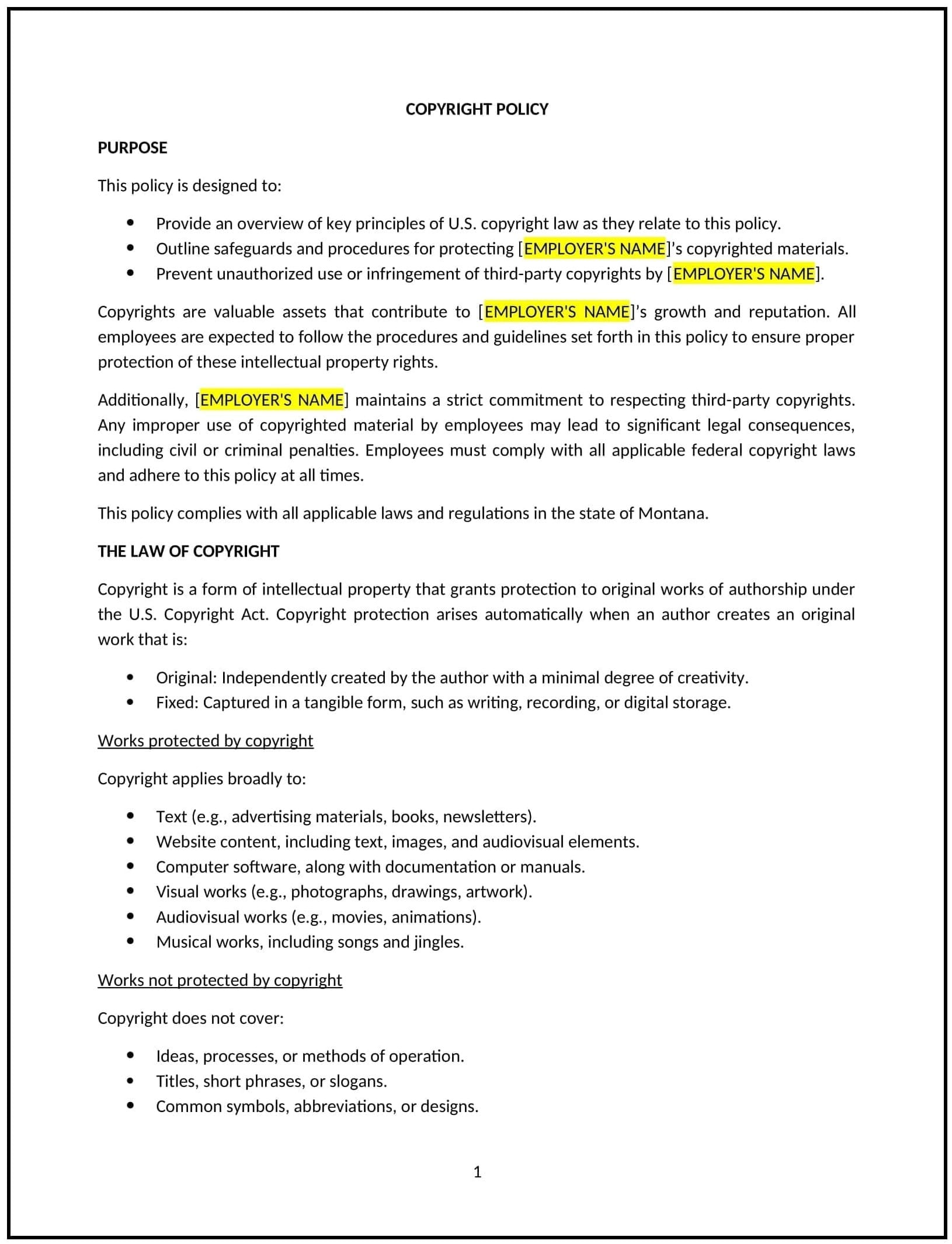Got contracts to review? While you're here for policies, let Cobrief make contract review effortless—start your free review now.

Customize this template for free
Copyright policy (Montana)
A copyright policy helps Montana businesses protect their intellectual property and respect the intellectual property rights of others. This policy outlines the procedures for handling copyrighted materials, both owned by the business and obtained from third parties. It also sets guidelines for how employees should use, share, and distribute copyrighted works within the company.
By implementing this policy, businesses can safeguard their creations, avoid infringement, and promote awareness of copyright laws among employees.
How to use this copyright policy (Montana)
- Define what constitutes copyrighted material: Businesses should clearly specify what types of works are protected by copyright, including written content, software, graphics, music, videos, and any other creative works produced by the business or third parties.
- Outline employee responsibilities: Employees should understand their role in respecting copyright laws, including not reproducing or distributing copyrighted works without permission from the rightful owner.
- Address the use of third-party materials: Businesses should set guidelines for how employees can use third-party copyrighted content, such as seeking permission or licensing the work before use.
- Establish procedures for obtaining permissions and licenses: Businesses should define how employees should obtain permission for using copyrighted materials, including obtaining licenses and contracts when necessary.
- Provide guidelines for fair use: Businesses should specify when and how employees can use copyrighted works under fair use provisions, such as for commentary, criticism, or educational purposes.
- Set consequences for copyright infringement: The policy should outline disciplinary actions for employees who violate copyright laws or the company’s copyright policies.
- Review and update regularly: Businesses should periodically review the policy to ensure it aligns with changing copyright laws, business needs, and technological advances.
Benefits of using this copyright policy (Montana)
This policy provides several key benefits for Montana businesses:
- Protects intellectual property: A clear copyright policy helps businesses protect their original works from unauthorized use or reproduction.
- Reduces legal risks: Businesses can minimize the risk of copyright infringement lawsuits by ensuring employees are aware of the rules surrounding copyrighted content.
- Promotes ethical use of content: The policy encourages employees to respect intellectual property rights and fosters a culture of ethical behavior in the workplace.
- Ensures proper licensing: By following established procedures for obtaining permissions and licenses, businesses can avoid costly legal battles or penalties.
- Enhances brand reputation: Businesses that respect copyright laws are seen as responsible and trustworthy by partners, clients, and the public.
- Facilitates creative freedom: With clear guidelines in place, employees can confidently create and share original content without fear of violating copyright laws.
Tips for using this copyright policy (Montana)
- Communicate the policy clearly: Ensure that all employees understand the importance of respecting copyright laws and the company’s expectations for using copyrighted content.
- Educate employees on copyright laws: Provide training to employees about copyright laws, fair use, and how to obtain permission for using third-party works.
- Implement a process for permissions: Establish a simple, streamlined process for obtaining permissions or licenses for third-party content to avoid delays and confusion.
- Regularly monitor for compliance: Periodically review employee work, especially when using third-party content, to ensure compliance with copyright guidelines.
- Address copyright infringement quickly: If a violation occurs, address it promptly with clear steps to remedy the issue, including withdrawing the material and taking corrective action when necessary.
- Stay updated on copyright laws: Regularly review changes in copyright law to ensure the policy remains current and aligned with legal requirements.